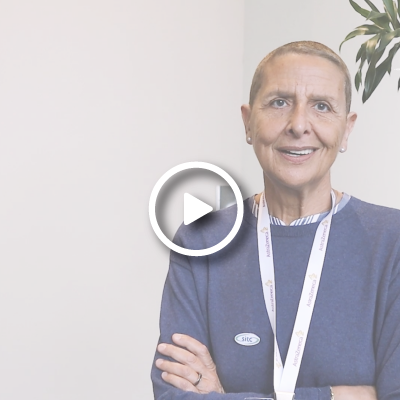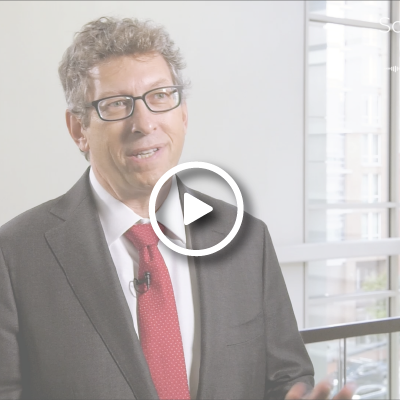November 16, 2021 -- WASHINGTON, DC - During the pandemic, clinical trial execution for cancer therapies has been challenging, said Dr. Samit Hirawat, chief medical officer at Bristol Myers Squibb, at the Society for Immunotherapy of Cancer's (SITC) 2021 annual meeting. Despite the challenges presented by the pandemic, Hirawat noted that stakeholders held patient safety and innovation as key priorities. Hirawat spoke with ScienceBoard onsite at the meeting.
Hirawat co-chaired a panel discussion with Dr. Margaret Callahan, research director of the immunotherapeutics program at Memorial Sloan Kettering Cancer Center, titled "Coronavirus, Cancer, and Immunotherapy: Navigating Clinical Trials and Treatment." Physicians and representatives from the pharmaceutical industry and the U.S. Food and Drug Administration shared their perspectives on how COVID-19 has impacted cancer clinical trials. Throughout the session, Hirawat noted common themes of collaboration and a priority on patient safety.
"We are on the cusp of a positive explosion," Hirawat said.
In addition to changes in clinical trial methodologies, the immunotherapy industry has seen the emergence of new targets (such as TIGIT and bispecifics) and a focus on multimodal approaches for cancer immunotherapy. Hirawat explained that the industry is figuring out how to harness the power of the innate immune system, which will have a positive impact on patients.
Bristol Myers Squibb has two approved cell therapies: lisocabtagene maraleucel for the treatment of diffuse large B-cell lymphoma and idecabtagene vicleucel for the treatment of multiple myeloma. The company is currently investigating its LAG-3-blocking antibody for the treatment of melanoma in phase III clinical trials. Concurrently, the organization is developing next generation CAR T- and NK cell therapies with an eye on induced pluripotent stem cell therapies in the future, according to Hirawat.
"There are going to be successes that we will celebrate. But there are going to be steps that we have to take to step backward and look at it from a broader perspective," Hirawat noted.
For instance, cell therapies have significantly improved outcomes for late-stage patients. The question now, however, is how to apply cell therapies earlier in disease progression. Hirawat stated that Bristol Myers Squibb will share evidence that some of its cell therapy candidates can be used as second-line treatments for large B-cell lymphomas at the upcoming American Society of Hematology 2021 meeting.
Manufacturing cell therapies is a very complex process that the industry will have to work through to evolve, he said. Hirawat also said that science needs to learn why certain patients do not benefit from cell therapies and then break down that barrier to identify new ways to treat those patients. Furthermore, Hirawat said that combination therapies will be "a mainstay if you want to achieve the ultimate goal of a cure."
Hirawat is passionate about incorporating the patient voice into the therapies that Bristol Myers Squibb is developing. He explained that the company's mission is to truly change the lives of the patients they treat, but they cannot do this without the patients.
Hirawat described that in the past year, Bristol Myers Squibb has modified its clinical trial protocols to reduce patient burden by engaging the patients in a proper way and that he is proud to be a part of those efforts.
Copyright © 2021 scienceboard.net









